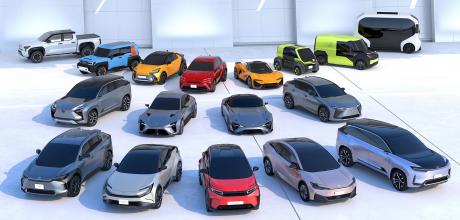Toyota’s battery electric future
With 30 new electric models, Toyota is going all-in on electric, targeting 3,5 million BEV sales by 2030
ON THE CHARGE
In response to what Toyota calls an “unexpected change” in demand for battery-electric vehicles (BEV), Akio Toyoda, the president of Toyota Motor Corporation, has announced a fresh emphasis on carbon-neutral technology. This will come in the shape of 16 all-new BEVs to go on sale by 2030, bringing the firm’s total battery-electric car park to 30.
Moreover, where Toyota currently sells two million BEVs per annum, it is aiming to almost double that figure to 3,5 million, for a global total of 10 million vehicle sales annually. Toyota also expects 100% of sales in Europe, North America and China to be BEV by 2030.
Of course, for a company with such a large car park and such lofty ambitions, Toyoda believes combustion engines will still play a dominant role elsewhere in countries like South Africa for the remainder of the decade. Speaking at a press conference showcasing Toyota’s 2030 plans, he said the company needs to reduce CO2 emissions as much and as soon as possible but stressed battery-electric could not, at least for now, be the only solution. “It is difficult to make everyone happy all over the world with a one-size-fits-all mobility option.”
The tip of the iceberg for this massive EV mobilisation is Toyota’s first bespoke EV, the bZ4X, set to launch in Japan midway through the year. It will be joined by a mid-sized SUV, compact SUV, small crossover, mid-size saloon, large SUV (with up to seven seats) and more, including existing models that will get plug-in battery options. There is even going to be an electric pickup truck.
Electric Hilux anyone?
The key to BEVs for Toyoda – as a keen road and race driver – is that they are fun to drive. “I was not interested in battery-electric cars before, but the ones we’re developing for the future I am interested in. Our strength is understanding what customers really want and the biggest challenge is to increase customer acceptance of carbon neutrality. However, we are now at a point where a safer, more fun-to-drive EV can be developed. It’s not just a business decision.”
From the Lexus side, the luxury arm of the company will go all-electric before Toyota by launching the recently teased RZ crossover, joined by a sportscar, and more. The company’s investment in electric vehicles, including work on next-generation batteries, will cost about ¥2,0 trillion between now and the end of the decade, all in the name of making Toyota’s manufacturing plants as close to carbon-neutral by 2035 as possible. That’s all in the not-so-distant future, but for now, we have the Toyota bZ4X to look forward to as the harbinger of its new Beyond Zero programme; a tall-riding midsized crossover with styling that riffs off the Prius hybrid and Mirai hydrogen vehicle. As with most recent Toyotas, the bZ4X has been co-developed with Subaru, which contributed its legendary all-wheel-drive expertise.
Although, the group’s first battery-electric model is technically the Lexus UX300e, the most compact of the Lexus SUV family that launched quietly in 2020. It features a 54 kWh battery, boasts a cruising range of 315 km and a zero to 100 km/h sprint time of 7,5 seconds. Toyoda believes its decades of hybrid know-how fed directly into the development of the UX300e’s motor, inverter, gears and battery. It is that knowledge transfer, Toyota’s broader approach to EVs, that will mark its strategy as distinct from its rivals.
And don’t forget our phalanx of self-charging Toyota hybrids in South Africa, including the latest Corolla Cross you can read about in this month’s magazine. They form the bedrock of the Toyota and Lexus non-plug-in hybrid line; the everevolving technology that is now into its fourth generation.


